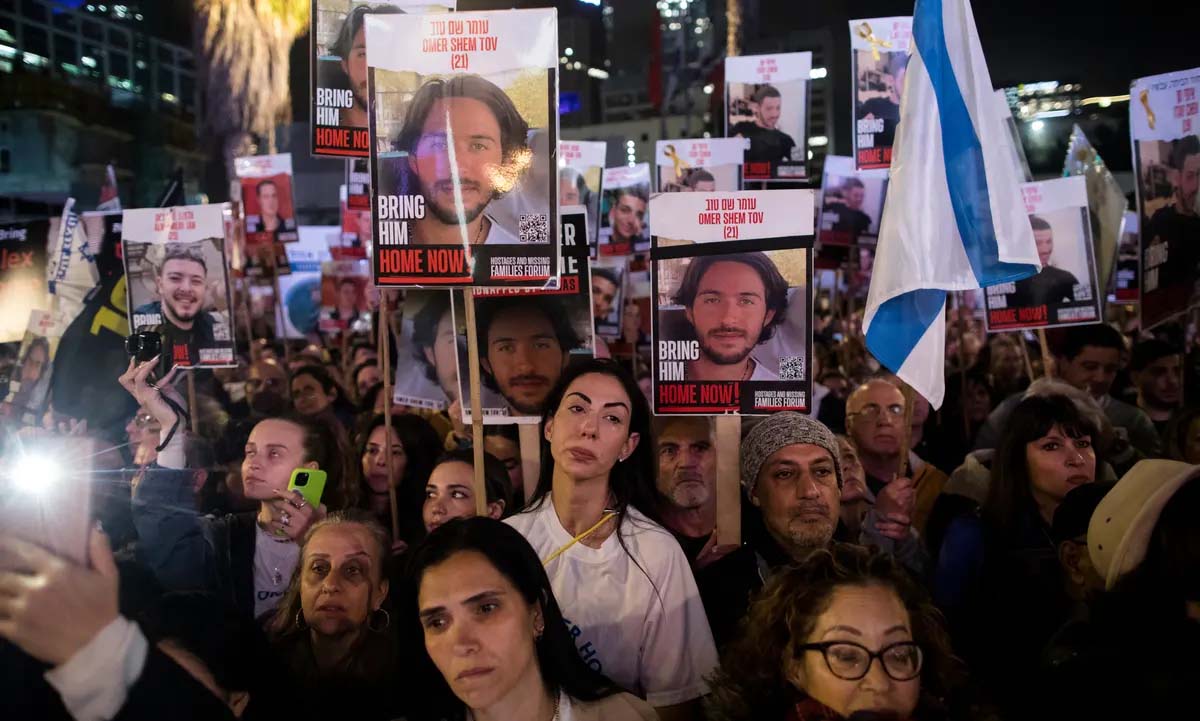In the heart of Jerusalem, fervent cries of “Now! Now! Now!” echo through the air during protests across Israel, urging the government to exhaust all efforts for the immediate release of numerous hostages held by Hamas.
Yet, amidst this collective plea, a distinct faction of hostage families advocates a divergent stance: advocating for the military to complete its mission against the militant group before prioritizing the return of their kin. These families posit that the potential consequences of any hostage deal, involving the release of a significant number of Palestinian militants detained by Israel, could pose a future threat to the nation.
Tzvika Mor, father of Eitan Mor, abducted four months ago from the Nova music festival, stands as a vocal proponent of this viewpoint. Mor emphatically asserts, “Releasing terrorists equates to inviting murder. History attests to this grim reality.” He underscores the broader concern for the nation’s security, stating, “Our focus extends beyond our son; we worry for the entire country.”
Mor’s perspective diverges sharply from that of most hostage families, who argue that only a negotiated deal can secure the captives’ freedom, given the perilous conditions in Gaza. The urgency of the situation escalated when Prime Minister Benjamin Netanyahu dismissed the latest Hamas demands for a hostage deal as delusional, committing to a relentless pursuit of victory through warfare.
The plight of the hostages has captivated the Israeli public, with city streets adorned with posters of the captives, and citizens donning symbolic military-style dog tags and yellow ribbons in solidarity. Protests advocating for a deal with Hamas intensify, marked by passionate outbursts and heightened vocal expressions, underscoring the growing desperation to bring the hostages home safely.
Acknowledging that his stance is unconventional, Mor remains steadfast, asserting that the Tikva Forum, founded by his family and two others, promotes a strategy of sustained military pressure, prioritizing national security over immediate cease-fires or hostage release deals. The forum, comprised mainly of religious and right-wing members, aligns closely with Netanyahu’s views.
Netanyahu’s resolute rejection of Hamas’s demands dealt a heavy blow to the majority of hostage families, with concerns voiced about the diminishing chances of future hostage releases. Adina Moshe, a 72-year-old former hostage, voices apprehension, expressing, “I fear that if this path continues, there may be no more hostages left to release.”
As Hamas leaders engage in talks in Cairo, Mor finds himself in the United States, advocating for Israel’s case of sustained military pressure. He contends that his actions align with his son’s wishes, recalling a discussion before the October 7th incident where Eitan expressed opposition to replicating the 2011 Gilad Shalit deal.
The Tikva Forum emphasizes the need for strength in negotiations, rejecting what they perceive as delusional demands from Hamas that could lead to further bloodshed. Netanyahu warns against surrendering to such demands, foreseeing not a release of hostages but an invitation to another massacre.
While the Tikva Forum’s stance contrasts sharply with prevailing sentiments, they assert rationality over emotional responses. With approximately 250 hostages taken in the October 7th attack, and the subsequent war claiming numerous lives, the complexities of the situation persist.
In November’s weeklong cease-fire, approximately 100 hostages were released in exchange for 240 Palestinian prisoners, predominantly women and children convicted of minor offenses. The current Hamas demands seek the release of hundreds, including those convicted of killing Israelis, a proposition vehemently opposed by the Tikva Forum.
Ditza Or, a founding member of the Tikva Forum, whose son Avinatan was among those taken by Hamas, believes her family’s stance reflects Avinatan’s values. Negotiations, according to Avinatan’s uncle Shimon Or, must emanate from a position of strength, deterring future attacks by Hamas.
Liran Berman, fearing the consequences of Israel’s current trajectory, highlights the stark reality: hostages are released during negotiations, and in the absence of a deal, only bodies return. Standing amidst the ruins of his brothers’ homes, he implores the government to seize any available deal to ensure the safe return of his siblings.
In the intricate web of perspectives, debates, and emotional turmoil, the question remains: Is a negotiated deal the path to reunion, or does sustained military pressure offer the best hope for the return of the hostages?









